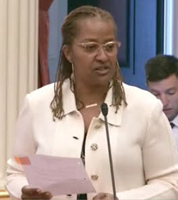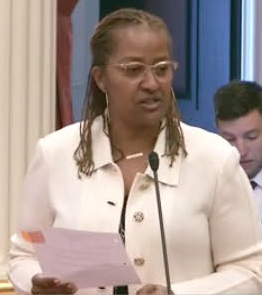
Senator Holly Mitchell

Screenshot from California Senate Democrats video
California Sen. Holly Mitchell urged fellow legislators to pass SB 639 in May 2019. The new law aims to increase consumer protections for medical services credit cards.
Starting July 1, veterinarians and other health care providers in California must comply with a new law governing how clients obtain and use medical services credit cards.
SB 639, signed into law in October, aims to protect consumers from taking on health care debt they can't afford. Highlights of the law include rules on how clients fill out credit card applications — they must do so independently, without assistance from practice staff — and an obligation that practitioners provide a written treatment plan prior to establishing credit. The law also prohibits charging cards for services more than 30 days before they are rendered, and sets limits on how deferred interest can be charged.
Veterinarians interviewed by the VIN News Service don't expect the new requirements to be onerous.
Medical services credit cards are offered, usually through doctors' offices, by third-party financial institutions. One of the most common brands used by veterinary clients is CareCredit. Pet owners might apply for CareCredit or similar financing when they learn that their pet needs treatment that they cannot afford upfront. The revised rules aim, in part, to reduce the chance that a pet owner will feel pressured to apply for a card.
One provision of the law prohibits veterinary employees from completing any portion of an application on the client's behalf. That is unlikely to be an issue at most hospitals, according to veterinarians and practice managers. Pet owners typically apply for financing options through lender websites on smartphones or tablets provided to veterinary hospitals by credit card companies.
Leslie Boudreau, a practice manager in Huntington Beach, California, said paper applications for credit cards are a thing of the past at her clinic. "We tell clients, 'Here's the website, apply here, see if you're approved for it,' " Boudreau said. "We haven't done a paper application in a long time."
CareCredit, a brand owned by Synchrony Financial, is a major third-party financer of veterinary, dental and other medical services. It is offered in more than 85% of veterinary practices nationwide, according to CareCredit.
Boo Larsen, CareCredit general manager and vice president of veterinary medicine, said the company has been reaching out since March to California veterinarians about the law, providing an explanation of the changes.
Veterinarians are exempt from a requirement in the new law that prohibits other health care providers from arranging or establishing credit in hospital treatment areas.
Another provision is that veterinarians must provide pet owners with a written treatment plan, itemizing what would be charged to the card. Providing a written treatment plan has been considered a best practice for years; the law codifies the requirement for the purpose of financing. In addition, the law provides an approximately 440-word disclosure that in 14-point type on page or screen must be provided to and signed by the pet owner who is establishing credit.
The law also forbids charging a credit card or a loan more than 30 days before services are rendered. So-called "precharging" is sometimes used for treatments repeated over time, such as radiation or chemotherapy.
Practice manager Grace Wu Ursery, with the four-hospital Veterinary Cancer Group in Southern California, says her practices stopped precharging years ago. While automating payments for cancer treatment may be convenient in certain cases, she said, charging early can create accounting headaches and sometimes necessitate refunds.
Dental patients' complaints prompt reform
The new law was spurred by issues in dental clinics, according to a 2019 commentary co-written by California Sen. Holly Mitchell, who authored the bill. Mitchell cited a case of a dental patient who, while sedated, signed up for two medical credit cards to cover $9,000 in treatments. The patient left her appointment with no memory of having done so. In addition, Mitchell wrote that advocates for low-income patients have heard of "countless cases" in which dental patients entitled to free or discounted care in California were not informed of that, but instead, were charged through medical services credit cards.
While egregious cases in dental practices may have been the impetus behind the law, Mitchell said veterinary practices aren't blameless. Mitchell told VIN News by email that groups such as the Western Center on Law and Poverty "had seen veterinary cases where the [pet] owner did not have the appropriate information when signing up" for third-party financing.
Mitchell also pushed for ending deferred interest. A fact sheet from her office contends that "few consumers really understand how deferred interest provisions work."
Such provisions give customers months or years to pay off purchases without incurring interest charges if they pay the debt within an allotted time. If they do not pay in full by the specified term, however, they are charged interest, often at high rates and sometimes based upon the entire sum financed. The law bans deferred interest provisions, which it defines as "a contractual provision that allows for interest to be charged on portions of the original balance that have already been paid off."
In general, deferred interest is used to describe interest charged to either the original balance or the unpaid balance. The law still allows for the latter.
The California Veterinary Medical Association was part of a coalition that blocked the effort to ban all deferred-interest products, according to Valerie Fenstermaker, CVMA executive director.
"We had concerns that a veterinary client would be faced with a decision to forgo treatment for their pet or consider euthanasia if deferred interest credit options were not available," Fenstermaker explained in an email to VIN News.
Mitchell said that due to changes negotiated with the CVMA, the law allows health care providers to arrange for or establish credit with interest so long as it is charged only on the unpaid balance.
A CareCredit representative told VIN News by email that even before the law change in California, it applied deferred interest only to unpaid balances, so its offers are compliant with the new law.
With deferred interest, customers are allowed a specified period, usually six, 12, 18 or 24 months, to pay off their balance without being assessed interest. If they fail to pay off the entire amount in the allotted time, or fail to make minimum monthly payments, interest on the unpaid balance —based on the monthly balances from the start of the promotional period — is added to the balance at a high rate. CareCredit offers deferred interest periods for clients who charge $200 or more, with an annual interest rate of 26.99%. By comparison, the average interest rate is 16% for new traditional credit cards, according to credit-card review website creditcards.com.
CareCredit general counsel Daniel Ro contends that consumers understand how deferred interest works. He said that more than 70% of CareCredit clients nationwide pay off balances before the promotional period is over.
"To do that, it seems likely you understand how it works," Ro said.
Dr. Gary White in Monrovia, California, said third-party financing fills a gap in his clients' finances, and that he's never received a complaint about the deferred interest on health care credit cards. He attributes that to good communication with clients.
"I warn them right upfront," White said. "Whenever we talk about [the deferred interest credit card] with clients, I explain, if they're ever late or haven't paid it off, they are charged [the interest] from day one."
He said that these credit cards and loans are an option for some clients who can't find the money another way. Conversations about affording care, the availability of pet insurance and other financial help start early in his conversations with pet owners, he said.
"I tell clients [with new puppies or kittens], 'If you can afford $6,000, and that's not going to affect your being able to pay your house payment, don't get pet insurance, don't get CareCredit,'" he said. "'If that's going to put you in a bind, investigate pet insurance and think about CareCredit.'"
SB 639 does not specify penalties for violating the law. However, Raphael Moore, general counsel of the Veterinary Information Network, an online community for the profession and parent of VIN News, said that veterinarians and/or hospitals that violate SB 639 could be subject to civil action by a client. They could be held responsible for paying the client's interest and penalties and possibly ordered to pay punitive damages, Moore said.